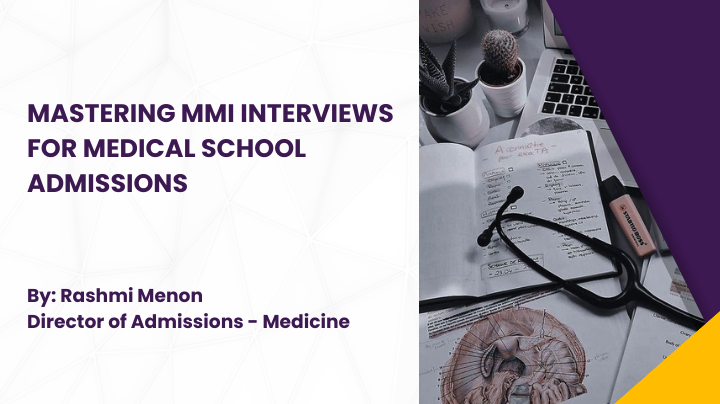The decision to pursue Medicine is almost always the easier part, as opposed to the application process itself which can seem quite daunting to a highschooler. It is not enough to know the deadlines, but rather to understand the entire step-by-step process to ensure that you are very well prepared at every stage. Keep in mind that United Kingdom is usually the most preferred destination for most students, owing to their rich heritage in Medical Training and numerous clinical opportunities.
The main stages involved are Testing, Application, and Interview. Once the applications are evaluated you receive calls for Multi Mini Interviews. These play a crucial role in determining the suitability of a student for a place in the Medical school. Through this blog we aim to provide you a comprehensive guide on how to navigate this critical step successfully.
Understanding the MMI:
The MMI is a format of interview designed to evaluate candidates on various attributes such as communication skills, ethical reasoning, empathy, critical thinking and other soft skills essential to become a competent medical practitioner. While some Universities conduct traditional one-to-one interviews, most of them prefer multi-mini-interviews. Candidates move between stations that evaluate a range of topics such as medical ethics, communication, teamwork, data analysis etc.
Duration and structure:
MMI interviews play a vital role in the medical school admissions process, and grasping their format is essential for effective preparation. Here are key considerations:
1.Duration:
- MMI interviews typically span approximately two hours.
- Within this timeframe, candidates move through various stations.
2.Number of Stations:
- Most MMIs consist of 10 stations or fewer, each evaluating distinct competencies.
- Candidates progress through these stations, encountering diverse scenarios.
3.Station Timing:
- Each MMI station is generally structured to last around 10 minutes or less.
- This brief duration underscores the significance of clear and concise communication.
Preparing for Online MMIs:
If your MMI is scheduled to be conducted virtually, it’s crucial to adequately ready yourself for the online format. Here are some important considerations:
- Verify Software Requirements:
Examine your interview invitation to determine the specific online platform in use (e.g., Zoom, Microsoft Teams, Blackboard Collaborate).
Confirm that you have the required software installed and acquaint yourself with its functionalities.
- Technical Arrangements:
Prioritize a dependable device and select a quiet, well-lit space for your online MMI.
Conduct an advance test of your internet connection to minimize the likelihood of disruptions during the interview.
- Professionalism in the Virtual Environment:
Dress in a professional manner, mirroring how you would for an in-person interview.
Sustain eye contact, even through the camera, to convey engagement and confidence.
Strategies and Tips:
- Confidence is key
- Convey your answer with a lot of confidence by using appropriate signposting, comfortable rate of speech and, good eye contact.
- Mind your language
- Ensure that the language used is professional, courteous, and avoid excessive repetition.
- Body language
- Maintain good posture and eye contact as it helps to exude confidence. Also observe the non-verbal cues of the interviewer to assess if you need to change or modify your answer to fit the question better.
- Update yourself on latest medical trends
- It is always beneficial to provide examples and data from current time frame. It indicates a deeper interest in the field and also helps substantiate your answer.
- You may be evaluated on your understanding of newest developments and your response to the same.
- Be aware of the role of NHS and GMC
- NHS and the GMC are the two main organizations that are integral to the healthcare industry in the UK. Research and revise about NHS topics and some of the frequently discussed cases and examples.
- Use the STAR technique
- S- Situation (explain the situation provided)
- T- Task (highlight the task that needs to be completed)
- A- Action (Use relevant examples to show what action is most appropriate and why)
- R- Result (discuss the final outcome of that action and why it is relevant)
In conclusion, meticulous preparation is the key to success in MMI interviews. These unique assessments demand a multifaceted skill set, encompassing effective communication, critical thinking, and adaptability. By delving into the nuances of the interview structure, understanding station dynamics, and simulating scenarios, candidates can cultivate the confidence necessary to navigate the unpredictable nature of MMIs. Preparation not only hones one’s ability to articulate thoughtful responses within stringent time constraints but also instills the poise needed to tackle diverse scenarios. In essence, investing time and effort in preparation is an indispensable prerequisite for mastering MMIs and ultimately securing success in the competitive landscape of medical school admissions.
Book a free MMI Session Now https://www.unihawk.com/enquire-now





